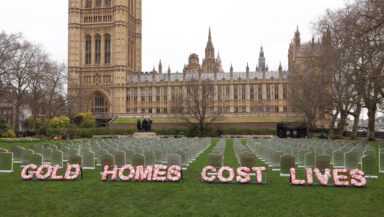What is carbon offsetting?
Offsetting is a way of paying for others to reduce emissions or absorb CO2 to compensate for your own emissions. For example, by planting trees to suck carbon out of the atmosphere as they grow, or by delivering energy-efficient cooking stoves to communities in developing countries. Sounds great, right?
Sadly, the way out of the climate emergency is just not that simple.
Don’t get me wrong – protecting forests and restoring natural ecosystems is vital both for wildlife and the climate, but we should be doing that as well as cutting emissions directly, not as a substitute.
The big problem with offsets isn’t that what they offer is bad – tree planting or renewable energy and efficiency for poor communities are all good things – but rather that they don’t do what they say on the tin. They don’t actually cancel out – er, offset – the emissions to which they are linked.
Offsetting projects simply don’t deliver what we need – a reduction in the carbon emissions entering the atmosphere. Instead, they’re a distraction from the real solutions to climate change. As a result, offsetting allows companies like BP and Shell as well as airlines to continue with their unsustainable behaviour while shifting their responsibility for the climate onto the consumer.
Planting trees can’t replace slashing carbon emissions
Many companies use offsetting to appear environmentally friendly, even when their whole business is based around burning fossil fuels. Airports like Heathrow and airlines such as Easyjet offer a carbon offsetting service, allowing passengers to pay to plant up to 12 trees per month. Oil giant BP runs a Target Neutral programme which incorporates a range of offsetting projects, including protecting forests in Brazil.
Tree planting is frequently lauded by companies such as Shell and BP as the answer to the climate emergency. Forests are one of our best lines of defence against climate change and restoring them is crucial, but this can’t be a substitute for reducing carbon emissions directly.
A newly-planted tree can take as many as 20 years to capture the amount of CO2 that a carbon-offset scheme promises. We would have to plant and protect a massive number of trees for decades to offset even a fraction of global emissions. Even then, there is always the risk that these efforts will be wiped out by droughts, wildfires, tree diseases and deforestation.
When trees and plants die, whether from fires or logging or simply old age, most of the carbon they have trapped in their trunks, branches and leaves returns to the atmosphere. Changes in the climate mean that droughts and higher temperatures will strain forests in the future. The risk is that trees planted as part of offsetting projects could become a source of emissions if they die prematurely. Carbon “stored” in trees or other ecosystems is not the same as fossil carbon left underground.
Carbon offsetting and climate justice
Then there’s the issue of climate colonialism, which Olúfẹ́mi O. Táíwò defines as “the domination of less powerful countries and peoples by richer countries through initiatives meant to slow the pace of climate breakdown.” It’s cheaper to set up offsetting projects in the Global South, which means that they may come at the cost of Indigenous Peoples’ rights, or they may be on land that would be better used for meeting local community needs.
For example, Amnesty International reports that the Sengwer people of Embobut forest in Kenya were violently forced from their homes and dispossessed of their ancestral lands as part of a government plan to reduce deforestation. The Sengwer people were moved without being consulted, and never consented to the plans for their removal – a violation of both Kenyan and international law.
Just as action on climate change shouldn’t harm ordinary workers in the UK, it shouldn’t come at a cost of already-persecuted people’s land rights. As Harpreet Kaur Paul says, “Climate justice means having the courage to imagine equity and fight for it”, and this principle should be at the front of everyone’s mind as we work to tackle the climate emergency.
Carbon offsetting plans are essentially PR plans
Offsetting schemes provide a good story that allows companies to swerve away from taking meaningful action on their carbon emissions. Offset schemes also serve to make fossil fuels more palatable to increasingly eco-conscious consumers.
Heathrow and BP would love for everyone to think they can continue with business as usual with no cost to the climate. But the truth is that the need to cut carbon emissions means they will have to change the way they operate – and there’s no way around that. We need to prevent emissions from getting into the atmosphere in the first place – and that means climate-wrecking industries have to completely change the way they do business.
Companies like BP, Shell, airlines and other high carbon pollution-creating industries want to use offsetting to continue business as usual. We can’t ignore the reality – there’s no way we can plant our way out of the climate emergency.
If we’re serious about tackling climate change, there is only one answer to the problem: these companies and industries need to put people and planet over profit by completely overhauling their business models.



